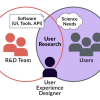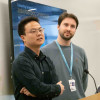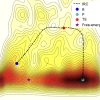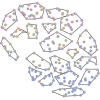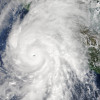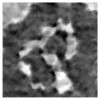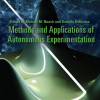News Center
STRUDEL to Hold Hands-on Hackathon at Berkeley Lab on March 19
STRUDEL, an emerging open-source science project at Berkeley Lab, is hosting a webinar and a hackathon in March to introduce software teams to a new user experience/user interface design tool that addresses the challenges of creating usable scientific software and puts user engagement at the forefront.
Read More »
2024 CSA Postdoc Symposium Showcases 26 Early Career Researchers
The CS Area recently held its fifth annual Postdoc Symposium at Berkeley Lab, where postdoctoral researchers currently working at the Lab shared 10-minute slide presentations on their exciting projects with an audience of peers, mentors, and coworkers. Read More »
Berkeley Lab’s STRUDEL Project Brings UX/UI Methods to Scientific Software Design
STRUDEL, an emerging open-science project at Berkeley Lab spearheaded by the Scientific Data Division’s User Experience team, is designed to enhance the development of user-centric software for scientific applications. Read More »
Machine Learning Yields More Efficient Hydrogen Combustion Reactivity Modeling
Researchers from Berkeley Lab, UC Berkeley, and Penn State University have shown that active learning-based machine learning atomic force prediction offers a more efficient and computationally affordable alternative to ab initio molecular dynamics in hydrogen combustion modeling.
Read More »
Berkeley Lab Affiliate Giulia Guidi Awarded SIAM’s Supercomputing Early Career Prize
Berkeley Lab is “where it all began” for this year’s Society for Industrial and Applied Mathematics Activity Group on Supercomputing Early Career Prize recipient, computer scientist Giulia Guidi. Read More »
Machine Learning Opens New Doors in Traumatic Brain Injury Research
In a paper published in Nature Scientific Reports, researchers from Berkeley Lab, UCSF, the Medical College of Wisconsin, and the University of California Berkeley – in conjunction with the TRACK-TBI collaboration – describe how an innovative machine learning approach can enhance the prognosis and understanding of traumatic brain injury and other complex medical conditions. Read More »
In a Warming World, Climate Scientists Consider Category 6 Hurricanes
As increasing ocean temperatures contribute to more intense and destructive hurricanes, climate scientists wonder whether the open-ended Category 5 on the Saffir-Simpson Windscale is sufficient to communicate the risk of hurricane damage in a warming climate. Read More »
New Tomographic Reconstruction Algorithm Developed at Berkeley Lab Sets World Record
A team of researchers from Berkeley Lab’s CAMERA developed a new tomographic reconstruction algorithm, TomoCAM, that leverages advanced mathematical techniques and GPU-based computing. Their method set a new world record by surpassing the speed of existing state-of-the-art iterative tomographic reconstruction algorithms. Read More »
Berkeley Lab Researchers Publish Pioneering Book on Autonomous Experimentation
Just as auto-complete was revolutionary for text composition, autonomous experimentation will change how experiments are performed. Berkeley Lab’s Marcus Noack and Daniela Ushizima published the first-ever book dedicated to this topic. Read More »









